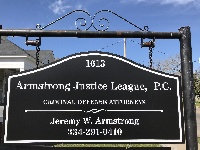Tuskegee Institute Misdemeanor Lawyer, Alabama
Jeremy W. Armstrong
✓ VERIFIEDCriminal, Felony, Misdemeanor, DUI-DWI, State Appellate Practice
"A Criminal & D.U.I. Defense Law Firm"
I have spent my entire legal career in the criminal justice system as a former prosecutor and a criminal defense attorney since October 2000. In Apri... (more)
Richard Dale Lively
Bankruptcy & Debt, Criminal, Bankruptcy, DUI-DWI, Misdemeanor
Status: In Good Standing Licensed: 30 Years
Julian Lenwood Mcphillips
Lawsuit & Dispute, Employment, Misdemeanor, Criminal
Status: In Good Standing Licensed: 50 Years
Branch Donelson Kloess
Misdemeanor, Criminal, Personal Injury, Car Accident, DUI-DWI
Status: In Good Standing Licensed: 36 Years
FREE CONSULTATION
CONTACT

